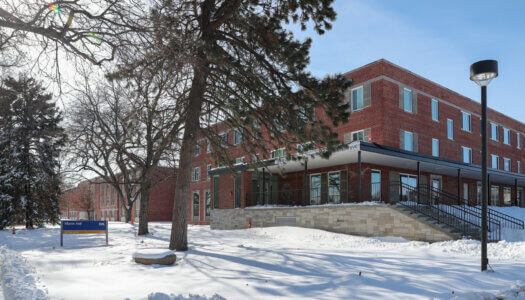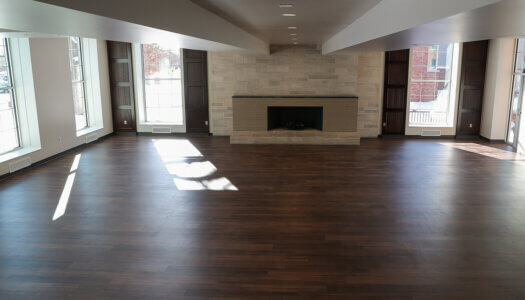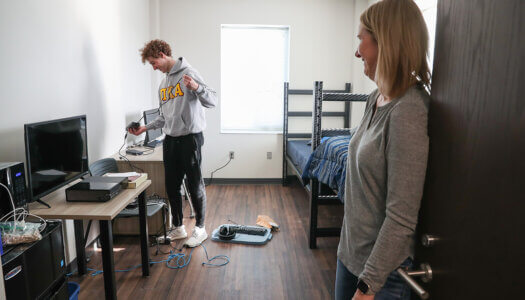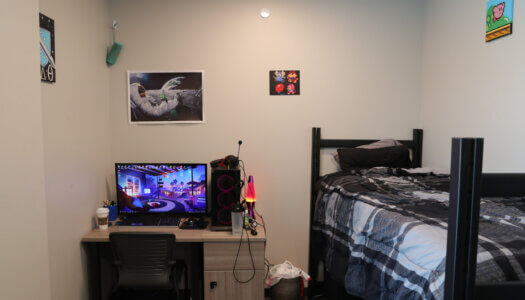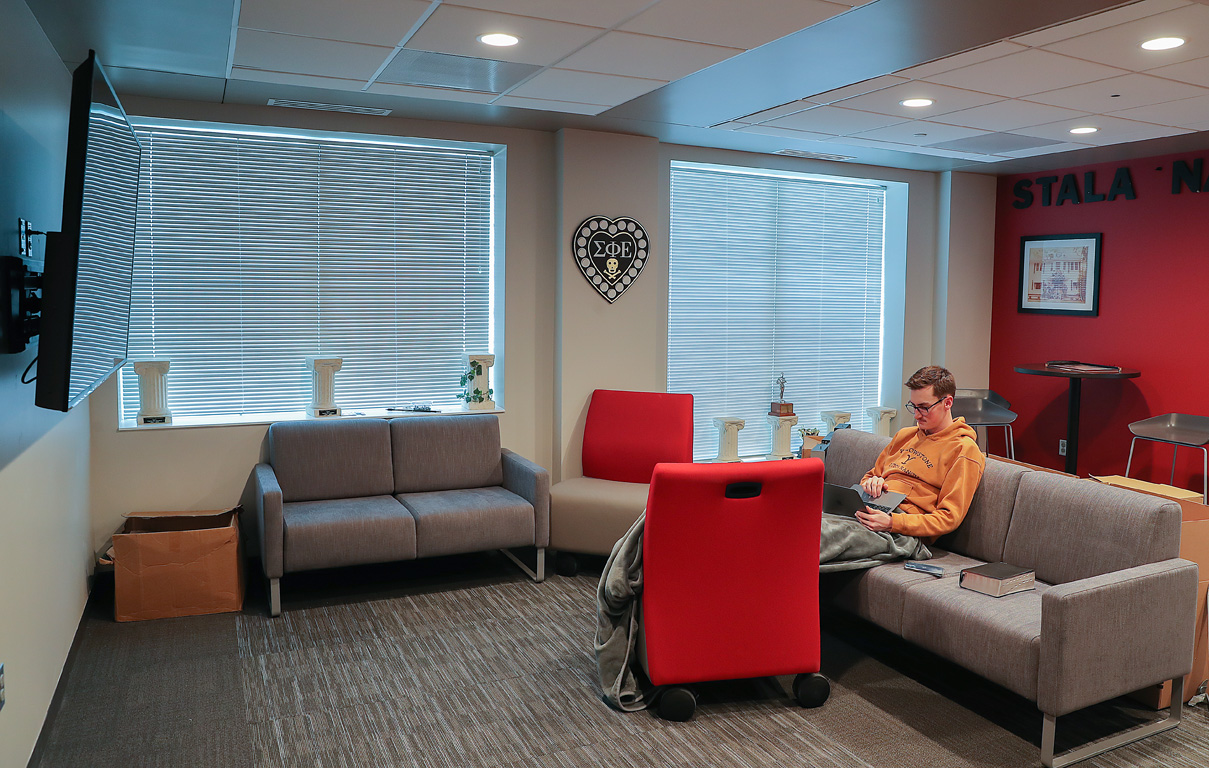
ATTEND THE GRAND OPENING
A ribbon-cutting ceremony and open house are scheduled for 1-2:30 p.m. Feb. 8 at Martin Hall. Campus officials will speak at 1 p.m., with tours offered until 2:30 p.m. The public is invited to attend.
By TYLER ELLYSON
UNK Communications
KEARNEY – Step inside the main entrance to Martin Hall and one of the first things you’ll notice is a cornerstone bearing the names of Herbert L. Cushing, the former president of the Nebraska State Teachers College at Kearney, as well as members of the Board of Education of State Normal Schools.
That stone, placed in 1953 when the residence hall was under construction, is one of the few features that remained untouched during a major renovation that transformed the nearly 70-year-old building into a modern living and hangout space for University of Nebraska at Kearney fraternity members.
Following 18 months of work to upgrade and improve the 42,500-square-foot building, Martin Hall reopened in mid-January as the new home for Delta Tau Delta, Phi Delta Theta, Pi Kappa Alpha, Sigma Phi Epsilon and Sigma Tau Gamma.
Connor Morrison, a music education major from Shelby, was among the first students to move in. His initial reaction: “It’s really nice.”
“I’m pretty grateful for the new building,” said Morrison, a previous vice president who currently serves as the new member educator for Pi Kappa Alpha. “I’m thankful the university saw our potential and how much we do and gave us such a nice building.”
The UNK senior views the project as a long-term investment in Fraternity and Sorority Life and, hopefully, a recruiting tool that increases chapter membership and convinces more upperclassmen to live on campus.
“We notice a trend in fraternities, once a guy moves off campus, his involvement in the chapter goes down,” Morrison said.

With brand-new fixtures, flooring and furniture and amenities such as single-person restrooms and showers, Martin Hall will certainly be a selling point for fraternities.
“It’s a completely new building, so a lot of guys are interested in it,” Morrison said. “That’s something we put at the top of the list now – our building just opened.”
Located just east of the Nebraskan Student Union in the northeast corner of campus, Martin Hall features dedicated housing pods for individual fraternities and flexible housing units designed to meet the chapters’ future needs. Each fraternity has its own chapter room and lounge, and there are shared study areas throughout the building. A “great room” on the main floor serves as an event space for the entire Fraternity and Sorority Life community.
UNK junior Grant Lindner, the secretary and house manager for Phi Delta Theta, believes the layout will bring the chapters closer together.
“It seemed like everybody had their own dedicated space before and everybody kind of just stayed in their own house. Now, we pretty much have to interact,” he said. “I feel like it’s going to lead to a lot more interaction between the different Greek organizations.”
Morrison agrees.
“It’s going to force us to get a lot closer,” he said. “Before, yes, we were in the same building, but we were also in our own areas. They didn’t have access to ours and we didn’t have access to theirs. In this new building, you’re going to see a lot more teamwork in the coming years, which is a huge positive in my book.”

REPLACEMENT PROJECT
The UNK fraternities were previously housed on the west side of campus in University Residence North (URN) and University Residence South (URS). Those residence halls were built in 1991 and 1992 as a temporary and quick solution to housing needs for the fraternity and sorority community, which was moved onto campus to provide a safe, education-centered environment for members.
The wood-frame buildings were only designed to last 20 years. Three decades later, they have the highest annual maintenance and operating costs among UNK’s residence halls and continue to experience mechanical infrastructure issues. It would cost an estimated $37 million to make the repairs and improvements needed to keep them in use.
“Those buildings have served us well for 30 years, but in looking at our housing master plan, they were first on the list to be replaced,” said Trelana Daniel, director of Residence Life.
The Martin Hall renovation is the first piece of that replacement project.
A 41,200-square-foot residence hall under construction directly north of Martin will serve the Alpha Omicron Pi, Alpha Phi, Alpha Xi Delta and Gamma Phi Beta sororities and feature a similar layout with chapter rooms, chapter lounges, study areas, assigned housing pods and flexible housing units. There will also be meeting and lounge space for UNK’s three multicultural chapters – the Lambda Theta Nu and Sigma Lambda Gamma sororities and Sigma Lambda Beta fraternity.
The fraternity and sorority residence halls will face each other, with a green space in between serving as an extension of the student union plaza. This location puts some of UNK’s most active students directly next to the student union, a hub of social activity on campus, and gives them easy access to dining options.

“Bringing our fraternities and sororities closer to the rest of the on-campus community will help these students be more connected to campus, and the proximity will help show the benefits of membership to the larger UNK community,” said Karlee Nuttelman, assistant director of Fraternity and Sorority Life.
Lindner sees the same benefits.
“It’s really nice being back on this side of campus again,” the information technology major from Central City said. “I lived in the Towers my first year, and it was really nice being close to the union and being able to visit people at the other residence halls super easily. Over there (at URN and URS), you’re kind of isolated.”
More than 600 students are involved in Fraternity and Sorority Life at UNK, and 174 of them currently live in the dedicated on-campus housing. Martin Hall and the new residence hall for sororities are large enough to accommodate about 245 total beds.
The entire housing project costs $32.65 million, with funding coming from facilities reserves, housing income and an internal lending program. By eliminating Louie’s Diner, a food court in URS, the university expects to save $250,000 to $350,000 in yearly food services expenses. Additional savings will be realized by sharing residence hall staff with nearby campus housing.
The four sororities housed in URN and URS will remain there until the new residence hall is complete. Those buildings are also being used to temporarily house employees who were relocated because of other campus construction projects at Calvin T. Ryan Library and Warner Hall.
URN and URS will be razed after the new housing complex is complete.



